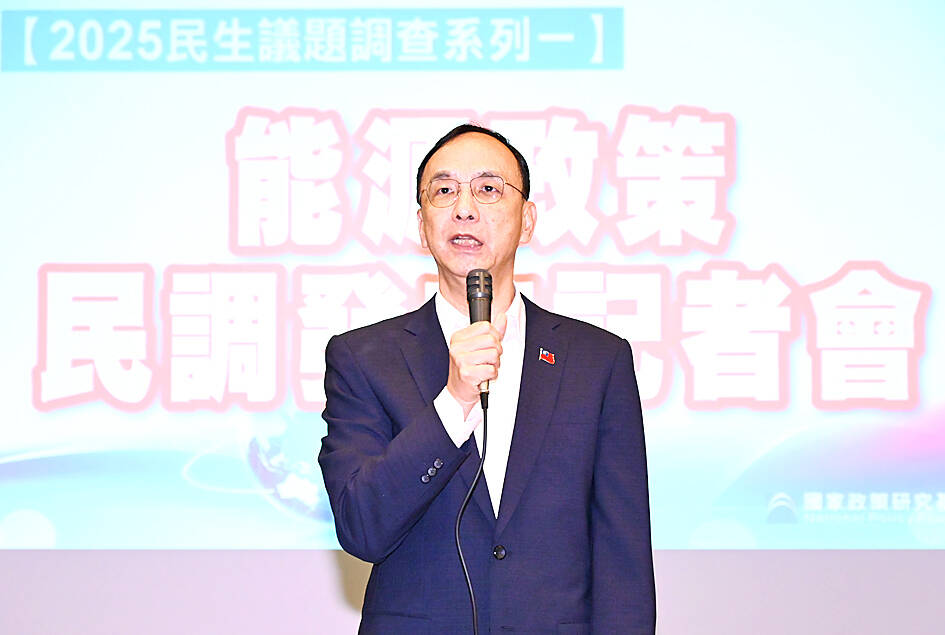The Chinese Nationalist Party (KMT) would push for amendments to the Nuclear Reactor Facilities Regulation Act (核子反應器設施管制法) this legislative session to extend the use of the nation’s nuclear power plants, KMT Chairman Eric Chu (朱立倫) said yesterday.
Chu made the remarks at a press conference in Taipei during which a poll conducted by the party’s think tank was publicized, showing that 73.6 percent of respondents supported the extension of nuclear power plant operations, while 20.7 opposed it.
Taiwan in July last year shut down the No. 1 reactor of its only active nuclear plant, the Ma-anshan Nuclear Power Plant in Pingtung County’s Ma-anshan (馬鞍山), and is poised to become the first non-nuclear country in East Asia after the last reactor’s license expires in May.

Photo: Chu Pei-hsiung, Taipei Times
Chu said the KMT’s proposed amendments would seek to extend the life of existing nuclear reactors from 40 years to 60 years.
The KMT hopes for bipartisan talks that can extend the life of nuclear energy reactors, he added.
According to the poll, 77 percent of respondents were in favor of amendments to the Electricity Act (電業法) that would establish a supervisory committee for the energy industry to ensure transparency and efficiency, while 12 percent were against.
On the shift from a nuclear-free to carbon-free policy, 57.8 percent of respondents were in favor, while 25.5 disagreed, the poll showed.
Chu said the nuclear-free policy has negatively impacted Taiwan’s energy development, adding that shutting down nuclear power plants in favor of green energy sources raises electricity prices and thermal power generation creates severe air pollution.
Due to Taiwan’s limited natural resources, it must rely on imported, nuclear and green energy sources, Chu said.
While the US has stopped developing wind power, unlike Taiwan it can rely on mining and domestic energy production, he said.
“The governing party is focused on politics, while the KMT is focused on people’s livelihoods,” Chu said, referring to the Democratic People’s Party’s push for a recall of KMT lawmakers.
The KMT is proposing several key policies to tackle the challenges of energy production, he said.
The Ministry of Economic Affairs’ Energy Administration currently leads energy management, but it has to comply with central government policies and cannot operate independently, Chu said.
The KMT is proposing to amend the Electricity Act to establish an independent energy supervision committee to address public concerns and resolve issues, he said.
The Ma-anshan Nuclear Power Plant is scheduled to close in May, but experts have warned that Taiwan might face serious power shortages and the industrial sector has raised concerns, Chu said.
Countries around the world are aiming to reduce carbon emissions, achieve net zero goals and phase out coal, he added.
Taiwan should focus on being carbon-free rather than nuclear-free, which is an outdated concept, he said.
Transitioning from a nuclear-free approach to a carbon-free approach aligns with global trends and is crucial in the development of artificial intelligence, he added.

US climber Alex Honnold is to attempt to scale Taipei 101 without a rope and harness in a live Netflix special on Jan. 24, the streaming platform announced on Wednesday. Accounting for the time difference, the two-hour broadcast of Honnold’s climb, called Skyscraper Live, is to air on Jan. 23 in the US, Netflix said in a statement. Honnold, 40, was the first person ever to free solo climb the 900m El Capitan rock formation in Yosemite National Park — a feat that was recorded and later made into the 2018 documentary film Free Solo. Netflix previewed Skyscraper Live in October, after videos

NUMBERS IMBALANCE: More than 4 million Taiwanese have visited China this year, while only about half a million Chinese have visited here Beijing has yet to respond to Taiwan’s requests for negotiation over matters related to the recovery of cross-strait tourism, the Tourism Administration said yesterday. Taiwan’s tourism authority issued the statement after Chinese-language daily the China Times reported yesterday that the government’s policy of banning group tours to China does not stop Taiwanese from visiting the country. As of October, more than 4.2 million had traveled to China this year, exceeding last year. Beijing estimated the number of Taiwanese tourists in China could reach 4.5 million this year. By contrast, only 500,000 Chinese tourists are expected in Taiwan, the report said. The report

Temperatures are forecast to drop steadily as a continental cold air mass moves across Taiwan, with some areas also likely to see heavy rainfall, the Central Weather Administration (CWA) said. From today through early tomorrow, a cold air mass would keep temperatures low across central and northern Taiwan, and the eastern half of Taiwan proper, with isolated brief showers forecast along Keelung’s north coast, Taipei and New Taipei City’s mountainous areas and eastern Taiwan, it said. Lows of 11°C to 15°C are forecast in central and northern Taiwan, Yilan County, and the outlying Kinmen and Lienchiang (Matsu) counties, and 14°C to 17°C

STEERING FAILURE: The first boat of its class is experiencing teething issues as it readies for acceptance by the navy, according to a recent story about rudder failure The Hai Kun (海鯤), the nation’s first locally built submarine, allegedly suffered a total failure of stern hydraulic systems during the second round of sea acceptance trials on June 26, and sailors were forced to manually operate the X-rudder to turn the submarine and return to port, news Web site Mirror Daily reported yesterday. The report said that tugboats following the Hai Kun assisted the submarine in avoiding collisions with other ships due to the X-rudder malfunctioning. At the time of the report, the submarine had completed its trials and was scheduled to begin diving and surfacing tests in shallow areas. The X-rudder,